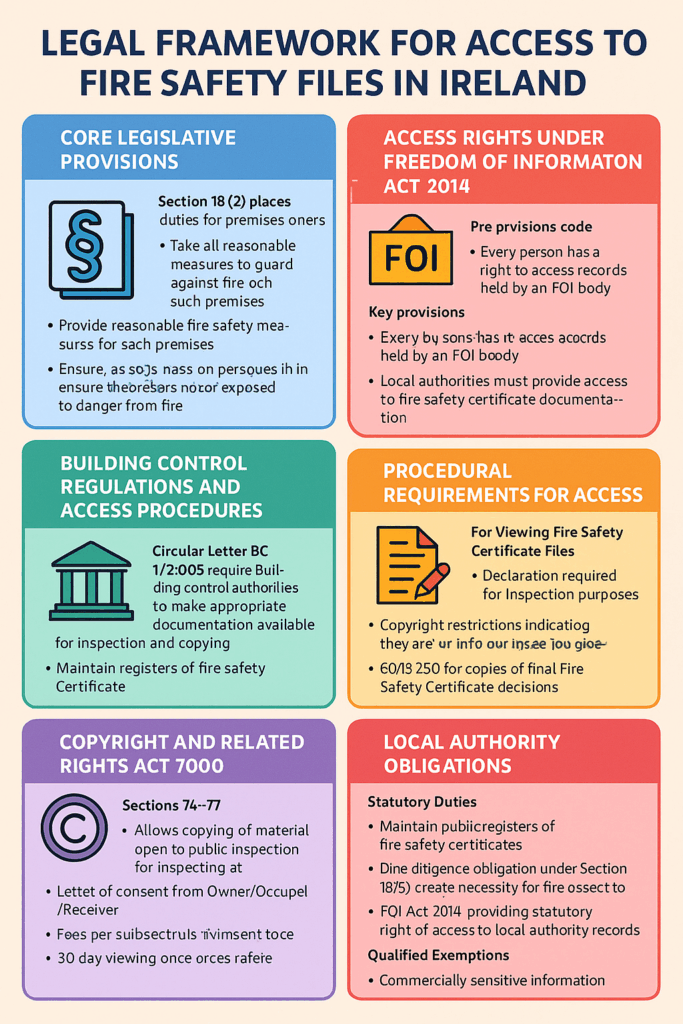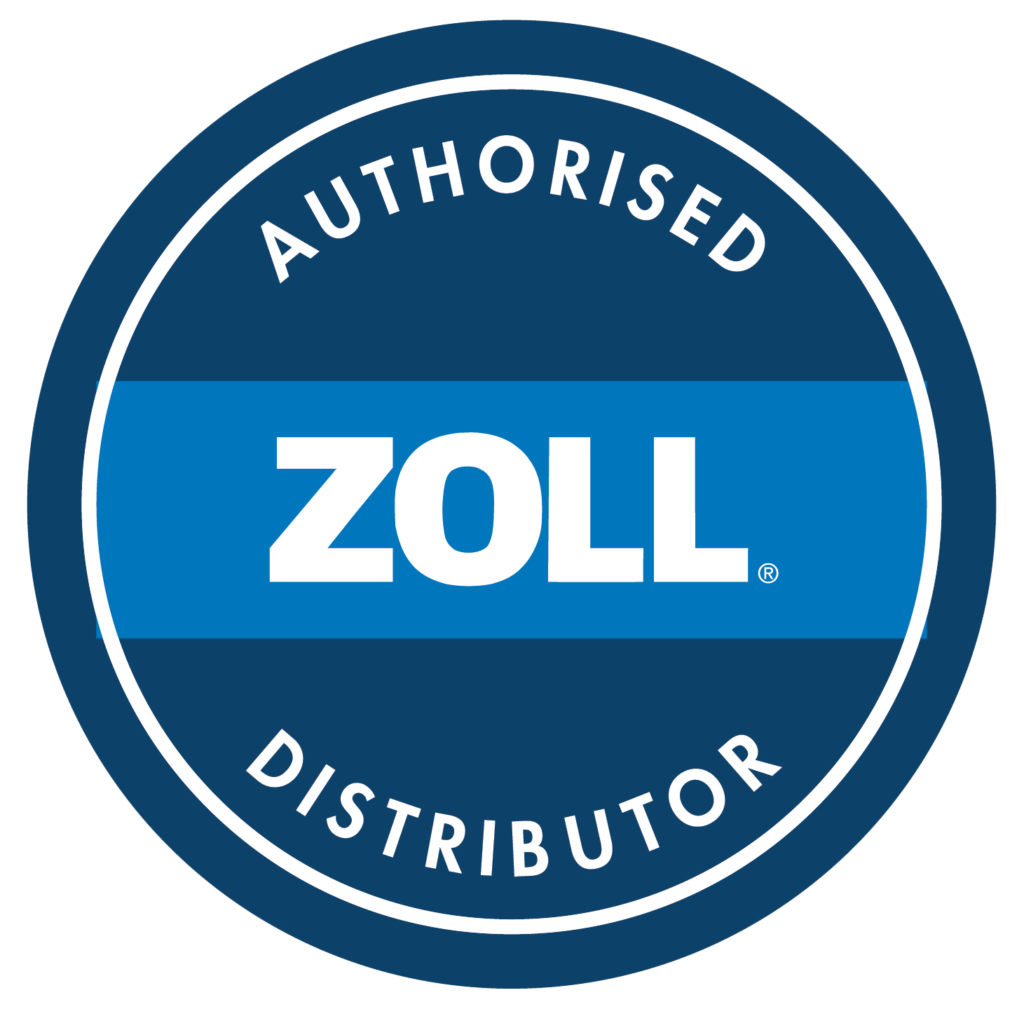Owner’s Fire Safety Duties (Fire Services Acts 1981 & 2003)
To access to fire safety files and local authority obligations under the Fire Services Act 1981 (as amended by Act of 2003), owners and occupiers of certain premises have a legal duty to ensure fire safety. Section 18(2) of the Act requires “every person having control over premises to which this section applies” (which includes most workplaces and public buildings) to take all reasonable measures to prevent fires and ensure, as far as reasonably practicable, the safety of persons on the premises. In practice, this means the building owner/occupier must have appropriate fire safety measures in place (e.g. alarms, escapes), prepare fire safety procedures, and maintain them at all times.
Likewise, Section 18(3) imposes a duty on any person on the premises to behave in a way that does not put others at risk of fire – essentially a personal responsibility to avoid causing fire danger. These provisions establish the owner’s “due diligence” obligation: an owner must exercise all due care and take reasonable precautions to comply with fire safety requirements. To fulfil these duties, an owner will typically need full knowledge of the building’s fire safety features and documentation (e.g. fire certificates, plans, risk assessments).
Fire Authority’s Role: The local authority (as the fire authority) is empowered to enforce these duties. For instance, the law allows fire authorities to inspect premises and even require the owner to carry out a fire safety assessment or remedial works if needed. While the Fire Services Act does not explicitly mandate the fire authority to hand over documents on request, it does state that a fire authority “may give advice in relation to fire safety to the owner or occupier of any premises”. In practice, providing relevant documents or information could be part of such advice. However, the primary legal mechanisms ensuring an owner’s access to the “fire safety file” are found in building control and information access laws.

Building Control Records and Fire Safety Certificates
Most buildings are subject to the Building Control Acts and Regulations, which require fire safety compliance at the design and construction stage. Specifically, for new builds or major alterations, a Fire Safety Certificate (FSC) must be obtained from the local Building Control Authority (usually the county/city council). The Fire Safety Certificate application file, which typically includes the fire safety design drawings, specifications, technical reports, any fire engineering assessments, and the granted certificate, constitutes a major part of the “fire safety file” for a premises. Local authorities maintain these files as part of their building control records.
- Public Register: By law, every building control authority must keep a register of building control matters. Regulation 21 of the Building Control Regulations 1997 (S.I. 496 of 1997) provides that the authority’s register includes particulars of all Fire Safety Certificate applications (along with other items like Commencement Notices and any relaxations or appeals). Moreover, Reg. 21(2) explicitly requires that this register “be kept at the offices of the building control authority” and be available for public inspection during office hours. In other words, anyone can visit the council’s offices and look at the building control register, which will show basic details of Fire Safety Certificates (such as application reference numbers, applicant name, building location, and the decision).
- Access to the Full File: While the regulations ensure the register itself is open, they imply that related documents (the contents of the fire safety file) should also be accessible. In 2005, the Department of the Environment issued Circular Letter BC 1/2005 to clarify policy on public access to building control documentation. (Appropriate building control documentation should be available for inspection and copying (at a charge to cover the cost), by or on behalf of interested parties, during normal office hours.) This circular directed local authorities to facilitate the inspection and copying of Fire Safety Certificate files by interested parties. It recognised that the Freedom of Information Act already gives rights to these records and provided guidance on handling issues like commercial sensitivity and copyright. For example, local authorities were instructed that “appropriate building control documentation should be available for inspection and copying (at a charge to cover cost), by or on behalf of interested parties, during normal office hours.”. In short, there is an expectation, as a matter of policy, that the entire Fire Safety Certificate file (plans, drawings, technical reports, correspondence, the certificate, etc.) will be made available upon request, not just the entry in the register.
- Consent and Procedure: If the building owner themself is requesting their file, local authorities will generally provide access relatively easily (often by appointment or via an application form). If a third party requests the file, councils may require the owner/occupier’s written consent before release, unless the request is made under Freedom of Information. (For example, Kildare County Council’s protocol requires a consent letter from the owner if someone else seeks the records.) In all cases, the Local Government Management Agency’s retention policy for local authority records should be noted. If the building and its file are older, the documents might be missing or not readily available, and the council would inform the requester if a file cannot be located.
Right of Access Under the Freedom of Information Act 2014
The Freedom of Information Act 2014 (FOI Act) is a central piece of legislation that gives any person a legal right to access records held by Irish public bodies, including local authorities. Local councils (and their fire/building control sections) are “FOI bodies”, meaning they must comply with the Act’s requirements to release information on request. In the context of a fire safety file, an FOI request by the owner would compel the authority to provide copies of all records in that file unless specific exemptions apply.
- General Right to Records: Under FOI, “every person has the right to access official records held by public bodies”, with certain limitations. This covers both personal and non-personal records. The fire safety file (being a collection of official documents like certificates, drawings, inspection reports, etc., held by the council) is squarely within FOI’s scope. The FOI Act 2014 basically “reinforces the right of access to public records” that might not otherwise be openly published. So, if the building owner asks under FOI, the local authority is legally required to respond and provide the records, subject to exemptions.
- Possible Exemptions: The FOI Act does contain several exemptions that could limit what can be released from a fire safety file. Notably, commercially sensitive information (under FOI 2014, section 36) may be withheld if, for example, the file contains trade secrets or confidential technical details supplied by a third-party firm. Another relevant exemption is for security or safety concerns (FOI 2014, section 32), a public body can refuse to release information if disclosure “could be expected to prejudice or impair…the safety of persons or the security of a building”. In theory, detailed building plans might be withheld on security grounds (to prevent misuse by someone with malicious intent), or certain personal data could be redacted. However, these exemptions are not absolute. The FOI Act requires authorities to consider whether the public interest outweighs the harm of withholding information in many cases. For example, since the owner of the premises is the requester here, the public interest in them having full information about their own building’s fire safety is strong. In practice, councils often release most or all of a fire cert file to the owner, perhaps with minimal redactions if needed (such as removing other individual’s personal phone numbers, etc.).
- FOI in Building Control Context: It is explicitly acknowledged in law that FOI is a proper avenue to get building control documents. The Building Control (Amendment) Regulations 2014 even added a clause “for clarity” stating that records related to the register’s entries can be accessed under the FOI Acts. This reinforces that anything in the Fire Safety Certificate register or file is obtainable via FOI. Freedom of Information 2014 provides a statutory right for the owner to obtain copies of the full fire safety file from the local authority. The council may charge a small administrative fee and must reply within strict timeframes set by the Act (generally 4 weeks for an initial decision).
Data Protection and Privacy (GDPR) Considerations
When providing access to a fire safety file, the local authority must also consider data protection laws, especially if the file contains any personal data. The General Data Protection Regulation (GDPR) and Ireland’s Data Protection Act 2018 govern how personal information is handled by organisations, including councils. In the context of a Fire Safety file, personal data could include names or contact details (for example, the name of the person who applied for the fire certificate, an architect or engineer’s details on technical documents, or perhaps correspondence that includes individuals’ names). If the building owner is a company or public body, the file likely contains little personal data, mostly technical and property information. But if the owner is an individual (or if individuals’ names appear in the documents), the council must ensure that releasing the file complies with GDPR. Generally, FOI and data protection regimes overlap: FOI allows access to official records (including those containing personal data), while GDPR grants individuals the right to access their own personal data. In an FOI request for non-personal records or someone else’s data, the council will use FOI exemptions (like the Section 37 exemption for personal information of third parties) to protect privacy. For example, the council might redact personal phone numbers or home addresses of third parties in the file before release, citing privacy grounds. On the other hand, if the owner is requesting data about themselves, the council could choose to handle it as a Subject Access Request under data protection law (which must be provided free of charge), or release it under FOI, since FOI also covers one’s own data.
Data protection law does not prevent the owner from obtaining the fire safety file; it simply requires the council to strip out or anonymise any unrelated personal data that shouldn’t be shared: the FOI Act 2014 and the Data Protection Act 2018 work in tandem here. Local authorities have a duty to protect privacy, but this will typically be a minor consideration when an owner seeks their building’s fire safety records (as most of the content is not highly personal in nature). The owner should be prepared that some personal names or contact info in the documents (if any) might be blacked out to comply with GDPR, but the substantive fire safety information will be provided.
Copyright and Usage of Technical Documents
One often-overlooked legal aspect of accessing a fire safety file is copyright. Documents like architectural drawings, engineering plans, and consultancy reports in the file are usually copyrighted by their creators. Normally, reproducing these without permission could infringe the Copyright and Related Rights Act 2000. However, Irish law contains a special provision to facilitate public access to such documents when they are part of a statutory public register or open for inspection by law. Section 74 of the 2000 Act provides that copying or making such material available “for the purpose of making [it] available for inspection at another time and place” does not infringe copyright, so long as it was material open to public inspection under a legal requirement. In plain terms, this means the council can give you copies of the fire certificate file (which is part of a statutory register under the Building Control Regulations).
Legally, as long as it’s only for your inspection/use in understanding the building, the law does require the council to mark the copies clearly with a notice that they are for inspection purposes only and no other re-use is allowed without the copyright owner’s consent. Additionally, the person requesting copies must sign a declaration that they are only using the material for inspection/review and not for commercial exploitation. Local authorities implement this by stamping all drawings and documents and having the requester sign a form (as referenced in the 2005 circular and council protocols).
This copyright mechanism is why, for example, you can get copies of the building’s fire plans from the council, but you cannot then publish them or use them for a new project without permission. It’s intended to let owners and other stakeholders do due diligence on fire safety without breaching intellectual property laws. Notably, Ordnance Survey maps included in applications have their own rules; the council can only copy them if they are originals or properly licensed copies. Copyright law supports the owner’s access to the full file by providing a safe harbour for the council to distribute copies for inspection, under certain conditions mandated by the Copyright Act 2000.
Recommended Procedural Pathway
A tiered approach is recommended, escalating as necessary:
Step 1: The Informal / Administrative Approach. The most efficient first step is to make a direct request to the local authority’s Building Control or Fire department. This request should be made in accordance with the council’s published access protocol, which can often be found on its website. For example, a requester dealing with Kildare County Council should follow the steps outlined in their “Policy on Access to Building Control Documents“, while one dealing with Dublin City Council should follow the procedure on their Fire Brigade’s webpage. This route is often faster and less formal, particularly if the requester is the building owner. It is advisable to cite Circular Letter BC 1/2005 as the basis for the request for the full file.
Step 2: The Formal FOI Request. If the administrative approach is unsuccessful, is unduly delayed, or if the council indicates an intention to withhold significant portions of the file, the owner should immediately proceed to a formal request under the Freedom of Information Act 2014. This is a powerful legal tool that shifts the process from a policy-based request to a rights-based application. It compels the local authority to issue a formal, written decision within a statutory timeframe (typically 20 working days) and to justify any withheld information by reference to specific exemptions in the Act.
Step 3: Appeal to the Information Commissioner. If the formal FOI request is refused, or if the owner believes that information has been improperly withheld or excessively redacted, they have a statutory right of appeal. The first step is an internal review by a more senior official within the local authority. If that fails to resolve the issue, a further appeal can be made to the Office of the Information Commissioner (OIC). The OIC will conduct an independent, binding review of the council’s decision.
Key Strategic Considerations
- Clarity of Request: To expedite the process, any request should be as specific as possible. It should include the full address and Eircode of the property, any known planning permission or fire safety certificate reference numbers, the year of construction, and the names of previous owners or developers, where known. Using a search request form, such as the one provided by Kildare County Council, can be a useful guide.
- Anticipating Redactions: An owner should expect that some information in the file will be redacted before release. This is most likely to be the personal data of third parties (names, signatures, etc.) to comply with Section 37 of the FOI Act and GDPR. Understanding that this is a legal requirement can prevent unnecessary disputes. The substantive technical and safety information should remain intact.
- Understanding Usage Limitations: It is crucial to understand that the documents, particularly architectural drawings and engineering reports, are provided for a specific legal purpose: inspection and due diligence. As confirmed by the procedures under the Copyright and Related Rights Act 2000, the requester will be required to sign a declaration to this effect. These documents cannot be legally reused for a new development, published, or commercially exploited without obtaining a separate licence from the original copyright owner.
| Access Mechanism | Governing Law / Policy | Typical Scope of Information | Key Procedural Steps | Potential Limitations | Associated Costs/Fees |
|---|---|---|---|---|---|
| Informal Request / Public Access Protocol | Building Control Regs 1997; Circular Letter BC 1/2005; Local Authority Protocols | Full file (plans, reports, certificate), subject to council review. | Contact council’s Building Control/Fire Dept. May require application form, owner’s consent (for 3rd parties), and copyright declaration. | Discretionary process. Access may be slower. Older files may be missing. | Fees for search, retrieval, and copying (e.g., Dublin: €60 for first file; Kildare: €12.50 for cert copy). |
| Public Register Inspection | Building Control Regulations 1997 (Reg. 21) | Basic “particulars” of applications and decisions (dates, names, location). Not the full file content. | Visit council offices during office hours. | Limited to summary information in the register itself. | Generally free to inspect. Fees for copies of entries. |
| Formal FOI Request | Freedom of Information Act 2014 | All records held in the file are subject to statutory exemptions. | Submit written request to council’s FOI officer, stating it’s an FOI request. | Subject to exemptions (Public Safety, Commercial Sensitivity, Personal Data) – 4-week decision timeline. | No application fee. No fees for personal data. Search/retrieval/copying fees may apply for non-personal data. Appeal fees may apply. |
Conclusion
For owners of premises seeking the complete fire safety file from a local authority, several pieces of legislation come into play:
- Fire Services Act 1981 & 2003: Imposes duties on owners to ensure fire safety (section 18(2) & (3)). While it doesn’t itself give a right to records, it provides the rationale (due diligence) for owners needing full fire safety information.
- Building Control Acts & Regulations: Require Fire Safety Certificates for buildings and oblige local authorities to keep a public register of applications and decisions, open for inspection. This forms the basis for public access to fire safety documents. (Building Control Regs 1997, art. 21; Building Control (Amendment) Regs 2014 clarifying FOI applies).
- Freedom of Information Act 2014: Provides a statutory right for any person (including a building owner) to request and receive copies of records held by a local authority, which includes the full fire safety file, subject only to limited exemptions. FOI ensures the council must provide access to official documents like drawings, certificates, inspection reports, etc., with only necessary redactions for sensitive material and consideration of public interest in disclosure.
- Data Protection Act 2018 (GDPR): Requires that any personal data in the fire safety file be handled lawfully and fairly. In practice, the local authority may redact personal identifiers of third parties under FOI privacy exemptions, but the owner will get their own information. GDPR principles ensure that releasing the file to the owner is done in a way that doesn’t unjustifiably harm anyone’s privacy.
- Copyright and Related Rights Act 2000: Sections 74 and 240 enable the council to provide copies of protected works (e.g. plans, drawings) that are on a statutory register, without infringing copyright, so long as it’s for public inspection purposes. The local authority must follow the required procedures (stamping documents and obtaining an inspection-use declaration) when giving out the full file.
All of the above legal provisions work together to ensure that a premises owner can access the complete fire safety file for their building. In practical terms, an owner should usually first approach the local authority’s fire or building control department informally, since they often grant access on request (especially to the owner) per national policy. If any difficulty arises, the owner has the formal backup of FOI 2014 to compel the release of the records. The local authority is obliged to comply with that, while also observing data protection and copyright rules in the process. By leveraging these rights, an owner performing due diligence under Section 18 of the Fire Services Act can obtain all relevant documentation, fire safety certificates, approved drawings and specifications, fire inspection reports or notices, fire risk assessments (if on file), and any other records relating to the premises’ fire safety, to help them meet their legal obligations for fire safety.
If you need practical, hands-on support in turning these legislative duties into day-to-day reality, particularly within healthcare or nursing-home settings, Phoenix STS can help. Our consultants specialise in fire‑safety audits, Fire Safety Certificate reviews, bespoke training and the full documentation trail required by HIQA, the Fire Services Acts 1981‑2003 and current Building Control regulations. We also guide providers through Freedom of Information requests to secure historic fire‑safety files, leaving you with a clear compliance roadmap and measurable milestones. Learn more here: Nursing Home Fire Safety Compliance









